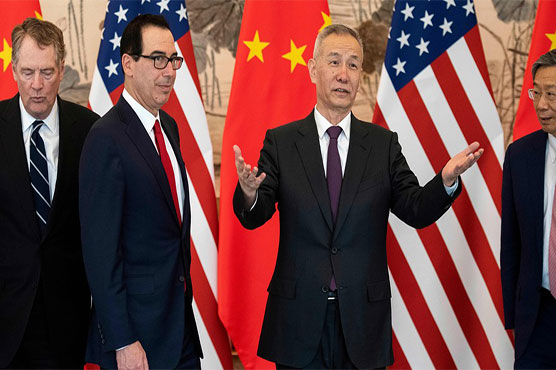US-China trade war escalates as Beijing returns fire

US-China trade war escalated as Beijing announced to raise tariffs on $60 billion in US exports.
WASHINGTON (AFP) - The US-China trade war escalated Monday as Beijing announced it would raise painful tariffs on $60 billion in US exports by next month, responding in kind to President Donald Trump s decision last week to hike duties on hundreds of billions of dollars in Chinese merchandise.
While American officials argue that they have the upper hand in the year-long clash, China struck back amid reports it could raise the temperature even higher by boycotting US agriculture, dumping American debt and cutting orders for Boeing aircraft.
However, US President Donald Trump left open the door for reconciliation, saying he expected a "fruitful" meeting next month with his Chinese counterpart Xi Jinping at a Group of 20 summit in Japan.
Trump has meanwhile also ordered the start of a process to impose new duties on about $325 billion worth of additional Chinese merchandise.
But he said Monday in Washington he had not decided whether he would ultimately impose those levies.
The increase in duty rates that Beijing announced Monday targets a range of American agricultural and manufactured goods, kicking levies up as high as 25 percent, according to a statement by the Tariff Policy Commission of the State Council -- China s cabinet.
Despite the retaliation, Beijing also appeared to give time to find a resolution by setting the June 1 date for those increases to take effect.
"China s adjustment of tariff-adding measures is a response to US unilateralism and trade protectionism," the statement said, adding that it hoped the US would work with China towards a "win-win agreement."
The announcement sent Wall Street stocks plunging, with the tech-rich Nasdaq having its worst day of 2019 and the benchmark Dow Jones Industrial Average closing at its lowest level since February 11.
But in a news conference, Trump was buoyant, telling reporters that his decision to increase tariffs was "a very positive step."
"I love the position we re in," he said during a joint news conference at the White House with Hungarian Prime Minister Viktor Orban.
"There can be some retaliation but it can t be very substantial by comparison."
Trump called on manufacturers fearful of the US tariff increases to build their wares in the United States -- or at least outside of China.
He said he was considering adding 25 percent duties on the remaining $325 billion in Chinese exports not currently subject to US tariffs.
"That is a tremendous amount of money that would come into our country," Trump said. "I have not made that decision yet."
Economists say the US-China trade war will weigh on the global economy, which is already forecast to slow this year.
Trump launched the trade war last year to extract profound economic reforms from Beijing, accusing China of seeking to forge global industrial dominance through massive state intervention in markets and the theft of American technology -- all in violations of its commitments upon joining the World Trade Organization in 2001.
Beijing rejects the charges and the United States and China have so far exchanged tariffs on more than $360 billion in two-way trade.
"China will never surrender to external pressure," foreign ministry spokesman Geng Shuang said at a regular briefing on Monday.
"The two presidents maintain contact through various means," he added, without confirming a possible meeting between the two leaders.
In addition to tariff hikes, China could also use other measures to hit back at the United States, as it imports fewer US products -- which limits its ability to match tariffs dollar-for-dollar.
"China may stop purchasing US agricultural products and energy, reduce Boeing orders and restrict US service trade with China," Hu Xijin, editor of China s party-owned Global Times, tweeted.
"Many Chinese scholars are discussing the possibility of dumping US Treasuries and how to do it specifically."
Beijing is the biggest holder of US debt, and Bloomberg estimated last year that China held around $1.2 trillion.
But US Treasury Secretary Steven Mnuchin told reporters on Monday he believed China would continue to buy US debt.
"I assume so. It s a good investment," he said, adding that no date had yet been set for a further round of negotiations to be held in Beijing.
Beijing s top trade negotiator, Liu He, likewise said Friday the next round would start in the Chinese capital at an unspecified date.
Meanwhile, aircraft manufacturer Boeing later said it remained "confident" US-China trade talks would yield an agreement.
The company depends on the Chinese market for a large share of its revenues.

